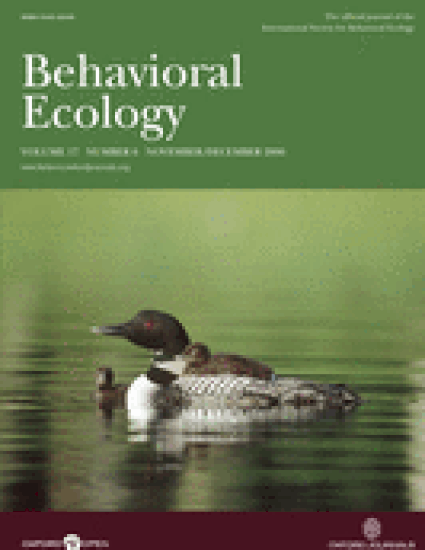
Article
Strong Material Benefits and No Longevity Cost of Multiple Mating in an Extremely Polyandrous Beetle, Chrysochus cobaltinus (Coleoptera: Chrysomelidae)
Behavioral Ecology
(2006)
Abstract
It is well established that females of many species exhibit polyandry. Although such behavior often increases female fitness by augmenting fecundity or enhancing the genetic diversity and vigor of their offspring, it often reduces female longevity. It has been argued that trade-offs between these costs and benefits should limit the degree to which females remate. However, the existence of highly polyandrous species suggests substantial polyandry benefits and/or minimal costs in some systems. Females of the leaf beetle, Chrysochus cobaltinus, are extremely polyandrous, providing an opportunity to examine the factors influencing the evolution of such behaviors. We compared the fecundity and longevity of singly mated females, females that mated multiple times with the same male, and females that mated multiple times with different males. Compared with females in the single mating treatment, females in both multiple mating treatments exhibited a significant reduction in latency to oviposition and, due to an increase in daily egg production, significant increases in lifetime fecundity. This difference diminished as the time since last mating increased. There were no differences in fecundity between the 2 multiple mating treatments, indicating that mate identity does not influence the material benefits of multiple mating. Surprisingly, female longevity did not differ among treatments. The pronounced fecundity benefits that females gain from multiple mating, coupled with a lack of longevity costs, apparently explains the extreme polyandry in this species. In addition, the existence of material fitness benefits via conspecific matings raises the intriguing possibility that in a C. cobaltinus–Chrysochus auratus hybrid zone, heterospecific matings may confer similar benefits to Chrysochus females.
Keywords
- Chrysochus cobaltinus,
- Chrysomelidae,
- Fecundity,
- Longevity,
- Multiple mating,
- Polyandry
Disciplines
Publication Date
2006
Publisher Statement
Copyright © 2015 International Society for Behavioral Ecology
Citation Information
Merrill A. Peterson and Steven K. Schwartz. "Strong Material Benefits and No Longevity Cost of Multiple Mating in an Extremely Polyandrous Beetle, Chrysochus cobaltinus (Coleoptera: Chrysomelidae)" Behavioral Ecology Vol. 17 Iss. 6 (2006) Available at: http://works.bepress.com/merrill_peterson/16/
